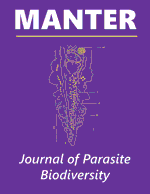Parasitology, Harold W. Manter Laboratory of

MANTER: Journal of Parasite Biodiversity
ORCID IDs
Trivellone https://orcid.org/0000-0003-1415-4097
Date of this Version
11-20-2022
Document Type
Article
Citation
MANTER: Journal of Parasite Biodiversity (November 20, 2022) number 24
doi: 10.32873/unl.dc.manter24
Abstract
We conducted a field synopsis and systematic meta-analysis of studies that carried out cophylogenetic analyses using algorithms and available software. We evaluated the influence of three factors—namely, cophylogenetic method, association, and ecosystem type—on the outcome of the analyses, that is, the degree of congruence between phylogenies of interacting species.
The published papers were identified using 4 different databases and 13 keywords; we included all studies for which statistical approaches to compare phylogenies (cophylogenetic analyses) of interacting lineages were used. After the initial screening, 296 studies were selected to extract response variable (outcome of the cophylogenetic analyses, i.e., congruent, incongruent, or both) and coded information of the three selected factors (method of analyses, association, and ecosystem type). The final dataset included 485 entries. The data were analyzed using the chi-square test and regression techniques.
We provided evidence for the outcome to be strongly dependent on the method; in particular, we are confident in expecting that phylogenies in mutualistic associations are congruent when using global-fit methods and in parasitic associations are incongruent when using event-based methods. Using a mixed-model approach, the most parsimonious model includes a non-nested structure of two factors (method and association), with a higher probability for parasites, herbivores, and pollinators to provide incongruent results.
We discuss the use of an alternative theoretical framework, the Stockholm paradigm (SP), to reanalyze published raw data, and the integration of the cophylogenetic analyses into a workbench (DAMA protocol, the policy extension of SP) aimed to anticipate emerging infectious diseases.


Comments
Copyright © 2022, Trivellone and Panassiti
License: Creative Commons Attribution-NonCommercial-ShareAlike 4.0 International